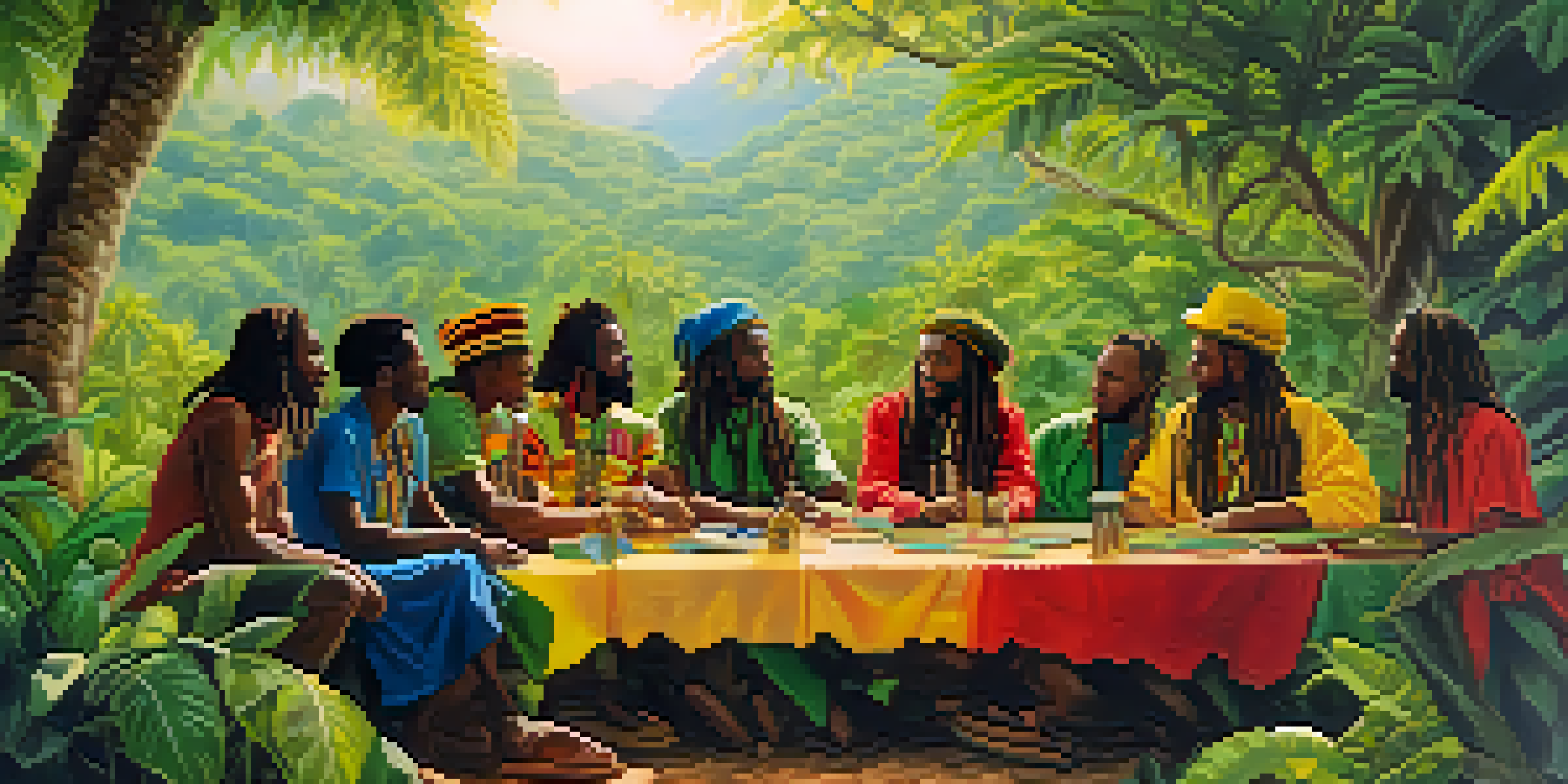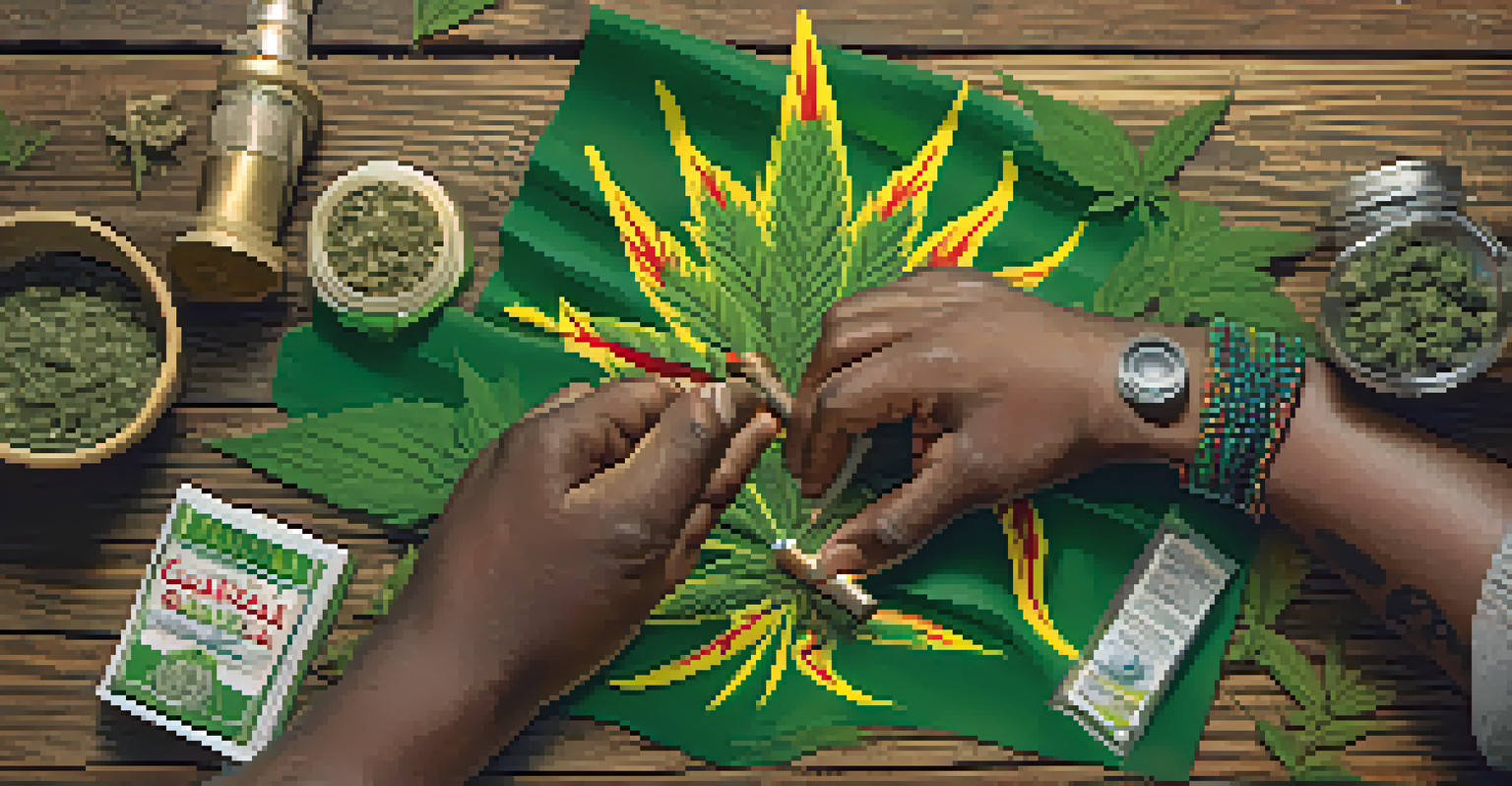The Use of Cannabis in Rastafarian Spiritual Beliefs

Understanding Rastafarianism and Its Core Beliefs
Rastafarianism is a spiritual and cultural movement that emerged in Jamaica during the 1930s. It is deeply rooted in the African diaspora's history, focusing on themes of liberty, identity, and divine connection. Rastafarians view Haile Selassie, the former Emperor of Ethiopia, as a messianic figure, embodying their hope for justice and freedom.
Cannabis is a symbol of resistance and liberation for Rastafarians, representing a rejection of oppression and an embrace of identity.
Central to Rastafarian beliefs is the idea of 'Zion' as a promised land, contrasting with 'Babylon'—a term that represents oppression and materialism. This dichotomy shapes the Rastafarian worldview and informs their spiritual practices, including the use of cannabis as a sacramental herb. This perspective invites followers to seek spiritual enlightenment and liberation from societal constraints.
As we dive deeper into Rastafarianism, it's essential to appreciate the movement's emphasis on community, music, and spirituality. These elements work together to create a holistic lifestyle that celebrates African heritage and promotes social justice.
The Role of Cannabis in Rastafarian Rituals
Cannabis, often referred to as 'ganja' within Rastafarian culture, plays a pivotal role in spiritual rituals and ceremonies. Followers believe that consuming cannabis facilitates a deeper connection with the divine, enhancing meditation and prayer. This sacramental use of cannabis is considered a means of seeking guidance and understanding from Jah, their term for God.

During gatherings known as 'reasoning sessions,' Rastafarians come together to smoke ganja and engage in discussions about spirituality, philosophy, and life. These sessions encourage a sense of community while allowing individuals to express their thoughts and feelings openly. The act of sharing cannabis reinforces bonds among participants, making it a communal experience.
Cannabis as a Spiritual Tool
In Rastafarianism, cannabis serves as a sacramental herb that fosters a deeper connection with the divine during spiritual practices and rituals.
Moreover, the ritualistic use of cannabis is often accompanied by music, particularly reggae, which serves as a backdrop for spiritual exploration. The combination of cannabis and music creates an atmosphere that fosters inspiration and connection, allowing practitioners to delve into higher states of consciousness.
Cannabis as a Symbol of Resistance and Liberation
For Rastafarians, cannabis transcends its physical properties, embodying a symbol of resistance against oppression and colonialism. The herb represents a rejection of Western values and an embrace of indigenous practices, fostering a sense of pride and identity among followers. This cultural significance contributes to cannabis's revered status within the movement.
Through the shared experience of using cannabis, Rastafarians reinforce their collective identity and foster solidarity within their community.
The use of ganja is often seen as an act of defiance against societal norms, particularly in regions where cannabis is criminalized. Rastafarians advocate for the legal recognition of cannabis, linking its use to broader social justice issues. This advocacy aligns with their mission to challenge systemic injustice and promote equality.
In this context, cannabis serves not just as a spiritual tool, but as a vehicle for social change. It empowers Rastafarians to assert their rights and reclaim their narratives, contributing to a larger conversation about freedom and self-determination.
Cannabis and Rastafarian Identity
The relationship between Rastafarian identity and cannabis is deeply intertwined, as the herb is often viewed as a sacred part of their culture. For many Rastafarians, embracing cannabis is an expression of their spiritual beliefs and a key element in their daily lives. This integration reflects a lifestyle that values authenticity and connection to one's roots.
Rastafarian identity is often showcased through various cultural expressions, such as music, art, and fashion, where cannabis plays a significant role. The imagery associated with ganja is prevalent in reggae music, symbolizing a carefree and spiritual existence. Through these representations, cannabis becomes a badge of honor for those who identify with Rastafarianism.
Symbol of Resistance and Identity
For Rastafarians, cannabis symbolizes resistance against oppression and is a key element in expressing their cultural identity and pride.
This complex relationship highlights how cannabis not only shapes individual identities but also unifies the Rastafarian community. The shared experience of using cannabis helps reinforce a collective identity, fostering solidarity among followers.
Misconceptions and Stereotypes about Rastafarians
Despite its cultural significance, Rastafarianism and its association with cannabis are often misunderstood. Many stereotypes depict Rastafarians as solely focused on drug use, overshadowing their rich spiritual beliefs and cultural practices. These misconceptions can lead to stigmatization, obscuring the true essence of Rastafarianism.
It's important to recognize that for Rastafarians, cannabis is a spiritual sacrament rather than a recreational drug. The focus is on the spiritual connection it fosters, rather than on mere consumption. By understanding this distinction, we can appreciate the deeper meaning behind cannabis use in Rastafarian culture.
Addressing these misconceptions is crucial for promoting a more nuanced understanding of Rastafarianism. By educating others about the movement's values and beliefs, we can help dismantle stereotypes and foster respect for this unique cultural practice.
The Global Influence of Rastafarian Cannabis Practices
Rastafarian cannabis practices have transcended Jamaican borders, influencing global perceptions of cannabis culture. As reggae music gained international popularity, so too did the spiritual messages associated with Rastafarianism. This cultural exchange has contributed to a broader understanding of cannabis as a powerful tool for spiritual and social exploration.
In various parts of the world, people have adopted aspects of Rastafarian culture, including the ceremonial use of cannabis. This has sparked conversations about the role of cannabis in spirituality and its potential benefits for mental well-being. As more individuals seek alternative paths for personal growth, Rastafarian practices offer a unique perspective.
Addressing Misconceptions
Despite its cultural significance, Rastafarianism is often misunderstood, with cannabis seen as merely recreational rather than a vital spiritual sacrament.
However, this global influence also raises questions about cultural appropriation and respect for Rastafarian traditions. It's essential to approach these practices with an understanding of their origins and to honor the sacredness of cannabis within the Rastafarian community.
Towards a Deeper Understanding of Cannabis in Rastafarianism
In conclusion, the use of cannabis in Rastafarian spiritual beliefs is a rich and multifaceted practice. It serves not only as a means of spiritual connection but also as a symbol of resistance and identity. By exploring the significance of cannabis within Rastafarianism, we can appreciate the depth of this cultural movement.
Understanding the role of cannabis invites us to reflect on broader themes of spirituality, community, and social justice. Rastafarians encourage a holistic approach to life, emphasizing the importance of connection to the divine and to one another. This perspective can inspire individuals from all backgrounds to seek their own spiritual paths.

Ultimately, by engaging with Rastafarian beliefs and practices, we can foster mutual respect and dialogue around the use of cannabis. This understanding can pave the way for more informed conversations about spirituality, culture, and the ongoing journey toward justice and equality.